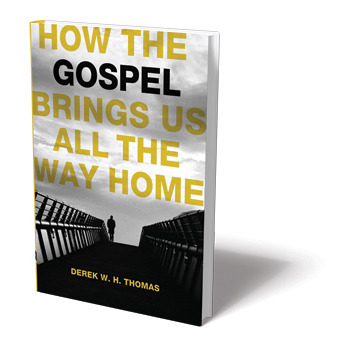R.C. Sproul's Blog, page 587
May 12, 2011
Schism and the Local Church
"Although the Great Schism occurred in the eleventh century, dealing with schismatic people in the local church has been a problem since the days of the apostles." This problem is the theme of Michael Brown's article in the current issue of Tabletalk. "Schism is a division within or split from a church. It occurs in a congregation or denomination when a faction is formed on the basis of something other than the faith once for all delivered to the saints. It is distinguished from heresy, which is false teaching about doctrine. While heresies can (and often do) lead to schisms, most schisms in the local church do not involve heresy. They usually erupt from some 'quarrel over opinions' (Rom. 14:1) in matters not essential to the faith."
"Although Christians have liberty to differ in their opinions about things such as, say, the age of the earth, healthcare, and the best school for their children, any attempt to base Christian unit y upon such opinions is illegitimate and schismatic. Our consumer preferences, cultural practices, or political convictions do not unite us in the church, and we have no right to divide over them. To do so is an attack upon the unity that the Spirit has given us."
Read Schism and the Local Church to learn about the problems those schismatic people may bring to a church.

May 11, 2011
VIDEO: CrossReference: Pity and Power
A few weeks ago we introduced a new series from David Murray and HeadHeartHand on the appearances of Christ in the Old Testament as the Angel of the Lord. Today brings the seventh episode in the preview series.
You can watch the first two episodes of CrossReference: Discovering Christ in the Old Testament here, and the remaining videos will be available for temporary viewing each week for the next three weeks at the Ligonier blog, Challies, and HeadHeartHand. Please note each episode will only be available for viewing for one week.
The DVD and study guide (sample here) are now available for purchase. Or you can download the films in HD.
Episode 7: Pity and Power

How the Gospel Brings Us All the Way Home, New from Reformation Trust
 If you were to think of the best news imaginable, what would come to your mind? That you are debt free? Healed from a terminal disease? Perhaps a new job after a long period of unemployment? While each of these examples would certainly be good news, in his new book Dr. Derek W.H. Thomas asks us to consider this as the best news imaginable: “There is therefore now no condemnation for those who are in Christ Jesus” (Rom. 8:1).
If you were to think of the best news imaginable, what would come to your mind? That you are debt free? Healed from a terminal disease? Perhaps a new job after a long period of unemployment? While each of these examples would certainly be good news, in his new book Dr. Derek W.H. Thomas asks us to consider this as the best news imaginable: “There is therefore now no condemnation for those who are in Christ Jesus” (Rom. 8:1).
Thomas writes, “Our status in relation to Christ makes all the difference. Outside of union with Christ, we are guilty and condemned. But ‘in Christ,’ we are declared not guilty (justified). Outside of Christ, there is only death (Rom. 5:12, 14, 17, 21); in union with Christ, there is ‘justification and life’ (Rom. 5:18, 21).”
How the Gospel Brings Us All the Way Home leads readers through Romans 8, revealing the steps through which God leads His people in the process of their salvation, but also loving counsel on such topics as prayer, resisting the Devil, as well as exhortations and comforts for weary pilgrims. Romans 8 is an overview of the Christian life.
Endorsements
“In a glorious section of God’s Word, Paul sets before us the trials and the triumphs, the pains and the gains, the indicatives and the imperatives of living life as a child of God—saved by Christ, led by the Spirit, and cared for by a heavenly Father.”
—Dr. Iain D. Campbell, Pastor, Free Church of Scotland in Point, Isle of Lewis, Scotland
“The best books are those that instruct the mind, engage the imagination, and ignite the heart with love for God. Dr. Derek Thomas’ How the Gospel Brings Us All the Way Home does all three. With theological care, textual precision, and a pastor’s heart, Dr. Thomas holds Paul’s glorious meditation in Romans 8 to our eyes and helps us remember again just how great is the salvation Jesus won for His people. If you want a better understanding of the Bible, a deeper appreciation for the gospel, and a spur to worship Jesus Christ our Savior, this book is a great place to start.”
—Greg Gilbert, Senior pastor of Third Avenue Baptist Church in Louisville, Kentucky
Inside the book
“Guilty! I can still hear that word as I close my eyes. It was 1975 in Oxford, England. I was passing by the city courthouse,where a murder trial was reaching its conclusion. The details were gruesome and the daily papers had carried detailed accounts of each day’s court proceedings. I am not sure what made me attend the final day, but I did. I watched with fascination as the judge placed a black shawl on his head just before he pronounced the final verdict: ‘Guilty.’ A roar of approval erupted in the courthouse. The defendant was found guilty of murder and condemned to a life sentence with no possibility of parole. Just as that man was found guilty in the judge’s eyes, we are all guilty in God’s sight: ‘None is righteous, no, not one . . . all have sinned and fall short of the glory of God’ (Rom. 3:10, 23). [Pages 1-2]
“Given the universal, pervasive sinfulness of human beings, how can anyone ever be in a right relationship with God? More particularly, how can a human being ever be in a right relationship with a holy God? More particularly still, how is it possible for a just God to justify a sinner? That is one of the greatest questions we can ever ask.
“To those with light views of sin, the justification of human beings may seem relatively simple to achieve. God is all-powerful, they conclude, and, after all, it is God’s business to forgive. Such trivializing of the issue signals the paucity of our understanding of who God is and what sin has done to our relationship with Him. God, Scripture declares, ‘will by no means clear the guilty’ (Ex. 34:7; Nah. 1:3). The holiness of God requires that justice be done in clearing the guilty, something that cannot be accomplished merely by an act of God’s will.” [ Pages 9-10 ]
How the Gospel Brings Us All the Way Home is a powerful exploration of the manifold gifts the heavenly Father has lavished upon His people--and a preview of the greater inheritance that lies ahead.
Read a Sample Chapter | Retail $15 - Buy the book now for $12
Are you a blogger?
Visit Blog for A Free Book to learn how you can receive a free copy of this book.
About Derek W. H. Thomas | More by Derek Thomas
 Dr. Derek W. H. Thomas is the associate minister at First Presbyterian Church in Columbia, South Carolina, and an adjunct professor of systematic theology at Reformed Theological Seminary. He is a council member of the Alliance of Confessing Evangelicals, which he also serves as editorial director and as editor of Reformation21, the Alliance’s online magazine.
Dr. Derek W. H. Thomas is the associate minister at First Presbyterian Church in Columbia, South Carolina, and an adjunct professor of systematic theology at Reformed Theological Seminary. He is a council member of the Alliance of Confessing Evangelicals, which he also serves as editorial director and as editor of Reformation21, the Alliance’s online magazine.
A native of Wales, Dr. Thomas graduated from RTS in 1978, then pastored for seventeen years in Belfast, Northern Ireland. He earned his PhD from the University of Wales, Lampeter. He served as the minister of teaching at First Presbyterian Church in Jackson, Mississippi, before his call to Columbia.
His interests include the music of Anton Bruckner, Richard Wagner, and Gustav Mahler, and he has a passion for good coffee. Dr. Thomas and his wife, Rosemary, have been married for almost thirty-five years.

Charles Hodge: Guardian of American Orthodoxy

Charles Hodge stands as one of the most influential giants of American Reformed theology. In his fifty-five years at Princeton Theological Seminary (1822–1878), he taught over three thousand students. Through his magnum opus, his three-volume Systematic Theology, he has taught countless thousands more. Many of today’s leading Reformed theologians count Hodge as one of their major influences. It is surprising therefore, that Paul Gutjahr’s biography is the first modern critical biography of Hodge to appear in print. A work of this kind is long overdue.
Gutjahr wryly comments that one of the things he learned while writing this book was that “if you are going to undertake a biography, pick a subject who dies young.” Hodge lived to the age of eighty. Gutjahr has chosen therefore to divide the major sections of his biography according to decades of the nineteenth century in which Hodge lived. Following three chapters that provide background on the Hodge family, the book begins with Hodge’s student years in the 1810s and then continues through the 1870s. The chapters in each section are relatively brief making this a highly readable book.
The strength of Gutjahr’s work, like that of any good biography, is that it allows us to see Hodge as more than just the author of theological works. We begin to see him as a human being, a product of his times. Hodge was not merely the author of the Systematic Theology. He was a devoted son, a loving husband and father, a faithful friend, and a loyal churchman. In this biography, we are also given great insight into certain aspects of nineteenth-century church history as we view them through the lens of one man’s life during that time.
As thankful as we should be for this work, there are a few weaknesses. In the first place, because Hodge lived such a long life, a biography of only four hundred pages must of necessity deal with many aspects of his life in a rather cursory manner. This necessity is, however, a weakness of the book. The brief chapters, while making for a very readable work, often leave one wanting more detail about specific events, conflicts, and relationships in Hodge’s life. Second, and related to the first issue, is the lack of citation of Hodge’s own writings. In a biography like this, citations from Hodge’s personal letters, for example, would shed invaluable insight into the character of the man.
A third issue I would like to bring to the reader’s attention is Gutjahr’s misleading claim regarding Hodge’s view of inerrancy. On page 275, Gutjahr writes: “It is important to note that while Hodge held the words of scripture to be infallible, he never personally advocated that they were without error in the original manuscripts.” Gutjahr says that the doctrine of inerrancy is something that Hodge “implied but never formally taught.” Gutjahr here seems to be attempting to draw a distinction between the view of Hodge and that of later writers such as B.B. Warfield, but his claim is inaccurate. For proof, I would simply direct readers to Hodge’s article entitled “The Inspiration of Holy Scripture, its Nature and Proof” (The Biblical Repertory and Princeton Review, vol. 29, no. 4 [1857], 660–698). Hodge, it is true, most often uses the word “infallible” to describe Scripture, but he defines infallibility as “absolute freedom from error (p. 682). He says that inspiration preserved an author from teaching error (p. 669). He says that “the Bible cannot err” (p. 671).
Fourth, and finally, is a problem that is not the author’s fault. For a volume that costs $74 retail and is published by one of the most respected academic publishers in the world, the number of typos in this book is inexcusable. There are literally dozens in the body of the text and in the footnotes.
In spite of these weaknesses, Gutjahr’s biography of Hodge is a helpful introduction to the life of the one who many called “the Pope of Presbyterianism.”

May 10, 2011
Support Ligonier through Crossway Impact
 Love both Crossway and Ligonier? Now you can support Ligonier Ministries through Crossway's new rewards program, Crossway Impact.
Love both Crossway and Ligonier? Now you can support Ligonier Ministries through Crossway's new rewards program, Crossway Impact.
Crossway Impact was created for readers who want to invest their resources wisely by buying books and making an impact. In addition to great annual benefits, you have the opportunity to send 5% of the money you spend at Crossway to the ministry of your choice, including Ligonier. And for the first year you get to name your own price for the membership fee. Annual benefits to the program include:
3 Free Books (choose print or e-books from a monthly list which must ship with a purchase of any amount). You can even get Dr. Sproul's Defending Your Faith for the month of May.
25% off all purchases on Crossway.org
Free shipping on orders over $50
Exclusive monthly offers
Be sure to check it out.

Imputation, Infusion and Eternal Consequence: A Parable
Also He spoke this parable to some who trusted in themselves that they were righteous, and despised others: “Two men went up to the temple to pray, one a Pharisee and the other a tax collector. The Pharisee stood and prayed thus with himself, ‘God, I thank You that I am not like other men—extortioners, unjust, adulterers, or even as this tax collector. I fast twice a week; I give tithes of all that I possess.’ And the tax collector, standing afar off, would not so much as raise his eyes to heaven, but beat his breast, saying, ‘God, be merciful to me a sinner!’ I tell you, this man went down to his house justified rather than the other; for everyone who exalts himself will be humbled, and he who humbles himself will be exalted” Luke 18: 9-14).
It is an unfair, gross distortion to hold that Rome teaches justification by works, while we Protestants teach justification by faith. The more accurate distinction recognizes on both sides the necessity of the work of Christ. Rome affirms that His righteousness is necessary for our salvation, that without it we are without hope. That righteousness, however, becomes ours through infusion. Protestants affirm also that His righteousness is necessary for salvation, that we have no hope without it. It, however, becomes ours through imputation.
Some here are quick to affirm that our differences now amount to nothing more than a tempest in a teapot. We are arguing over two, thick, theological terms that are not a part of our ordinary language. Surely such a nuance must be insignificant. But it’s not, as Jesus’ parable illustrates. Let’s look at these two men, what they have in common and what separates them.
First, it is an unfair, gross distortion to hold that the Pharisee believes he justifies himself. How quickly we pass over the one good part of his pray, “Lord, I thank you…” The Pharisee knows from whence came the power to make him righteous. He knows that he needed the grace of God, that God had to work in him, that God is due all the glory for his obedience. The publican likewise looks to God and His grace as His only hope. He knows where to turn, even as the Pharisee knows whom to thank.
The difference, however, is here. The Pharisee believes that God’s grace has made him whole, that he is now, albeit by the grace of God, just in himself. God helped him out. God stood him up. But now he is standing on his own two feet. He gives thanks to God that he is better than other men, that he doesn’t commit this sin and that, that he performs this duty and that. God has poured righteousness into him, and there he stands.
The publican, on the other hand, knows what he still is, a sinner. The mercy he cries out for isn’t that he would be made a saint, but that he would be a forgiven sinner. He cannot cooperate. He cannot stand. He can only, and even this is the grace of God, cry out for the mercy of God, which is found in Christ alone.
The bigger difference than the differing approaches of these two men, however, is what it meant for their eternities. Only one of these two men went home justified. Only one of these men was an adopted son of the living God. Only one of these two men will spend eternity walking with God in paradise. The other will spend eternity weeping and gnashing teeth. Teapot tempests have no such eternal consequences.
In our feel-good, dumbed-down, ecumenical age we find distinctions distasteful. In the faithful preaching of our Lord He demonstrates the difference they make. That said, may we Reformed protest against our own propensity to cry out, “I thank you Lord that I am not like other men, Arminians, semi-Pelagians, or even this charismatic. I score high on all theology exams and have a library that is the envy of my friends.” Instead let us, consistent with our theology, beat our breasts and cry out, “Lord, be merciful to me, a sinner.”
In our feel-good, dumbed-down, ecumenical age we find distinctions distasteful.

May 9, 2011
Get Dr. Sproul's Overview of the Bible for a Donation of Any Amount
Join Dr. Sproul on a unique study tour as he explores the major themes, events, and people that are brought to life in the Bible. Dust to Glory provides a panorama of biblical truth and a starting point to help you understand the content of the Bible. Dust to Glory can energize your study of the Bible, provide you with new insights, and improve your ability to read, understand, and apply Scripture to your life.
 This week you can get this CD series for a donation of any amount. Fifty-seven 23-minute messages, including the following:
This week you can get this CD series for a donation of any amount. Fifty-seven 23-minute messages, including the following:
The Image of God in Man
Moses and the Exodus
Characteristics of Wisdom Literature
The Miracles of Jesus
The Conversion of Paul
Hebrews
Introduction to Revelation
The Glory of God
Offer valid through May 15, 2011. Donate Now.
"I believe that Dust to Glory is the most important teaching tool Ligonier has produced. It is our prayer that it will serve you in your desire to grow in the knowledge and love of God. As Christians, we are called to be people of the Word. My hope is that Dust to Glory will encourage, stimulate, and assist you to master the Scriptures so that the Scriptures may master you."
—R.C. Sproul

Who Can Be Against Us?

God has promised to work everything together for the good of His people. If God is for us, it follows that, ultimately, nothing can stand against us. That is logical. Otherwise, God would not be God. If something could rise up against God and overcome Him, that other thing would be God. God would then prove to be a false god—no God at all. But on the contrary Paul is saying that in the last analysis, nothing can be against us if God is for us.
If something could rise up against God and overcome Him, that other thing would be God.
But this raises the million-dollar question: “Is God for me?” Perhaps even more pointed is the personal question:
“How do I know that God is for me?”
Well, do you know that? How do you know?
Satan is very insistent about this—indeed, he has been insistent on this question from the beginning. He asked it in the Garden of Eden. In fact, his first recorded words are an assault on God’s gracious character (will we never learn how much he hates God and His people?): “Did God put you in this lavish garden and forbid you to eat from any of its trees? What kind of God does that? You don’t think He is really for you, do you, if He does that kind of thing?” (see Gen. 3:1).
You will find this innuendo repeated in various forms and guises throughout your Christian life. You need to have biblical answers to these questions:
How do you know God is really for you?
Where should you look for the proof that God is for you? Does it lie in the fact that your Christian life has been unbroken happiness? Does it lie in the fact that your Christian life been one of ecstatic joy?
There is only one irrefutable answer to these questions. It cannot be found in our circumstances. It lies only in the provision that God has made for us in Jesus Christ.
This is the whole point of Paul’s question in verse 32. We can be sure that God is for us because this God, the God of the Bible, the God and Father of our Lord Jesus Christ, did not spare His own Son, but gave Him up to the cross for us all.
If this is true, Paul affirms, we can be confident He will give us everything we will ever need.
This is the only sure way we can know that God is for us.
Frequently in the closing pages of the Gospel records we are told that the Lord Jesus Christ was “delivered up” (e.g., Matt. 26:15; 27:2, 18, 26). He was handed over by one person or group to another until eventually He was handed over by Pilate to be crucified as a criminal.
But Paul understood that behind every human “handing over” was the purpose of the heavenly Father. He “handed over” (it is the same verb) His own Son to bear the condemnation due to sinners.
Here is the heart of the plan of God and the wonder of the gospel. The best of all men dies as though He were the worst of all criminals. This is not merely a matter of human wickedness destroying a good man. It is the heart of the purpose of God, as Isaiah had long before prophesied (Isa. 53:4–6, 10).
Behind the handing over of the Lord Jesus—by Judas Iscariot, by Herod, by the priests, by Pontius Pilate—stood the purposes of His heavenly Father handing Him over to the cross in order to die in the place of sinners. He bore God’s judgment and wrath against our sin.
What inexpressible love this is.

May 8, 2011
Twitter Highlights (5/8/11)
Here are some highlights from the various Ligonier Twitter feeds over the past week.

Tabletalk Magazine "There is not one blade of grass, there is no color in this world that is not intended to make us rejoice" - Calvin.

Ligonier Nobody has ever been a victim of injustice at the hands of God. -R.C. Sproul

Ligonier Michael Horton explains how biblical Christianity has been replaced by a vacuous moralistic & therapeutic deism. http://bit.ly/mPfMkg

Ligonier What pleases Him is good for me. That is one of the most difficult lessons Christians ever learn. -RC Sproul

Reformation Trust R.C. Sproul's two rules for prayer: "You should remember who is being addressed and who is doing the speaking."

Reformation Trust "Tell the truth" is to the preacher what "First, do no harm" is to the physician. -R.C. Sproul Jr.

Ligonier When God does His electing, He always does it in light of the fall. God only chooses fallen sinners for salvation. -R.C. Sproul
You can also find our various ministries on Facebook:
Ligonier Ministries | Ligonier Academy | Reformation Trust | Tabletalk Magazine

May 7, 2011
Links We Liked (5/7/11)
Here is a round-up of some of the notable blogs and articles our team read this week.
Jesus Is Risen - Here is a surprise performance of "Jesus Is Risen" in Arabic (sung in a mall in Lebanon).
Timeo Danaos? Not Any More - Carl Trueman always has something interesting to say.
E-Readers and Education - "Cash-strapped students across the U.S. have watched the rise of the e-readers with anticipation. It's understandable; these devices could ostensibly replace the expensive textbooks that many students shell out for every semester. Eventually. For now, e-readers are still supplemental devices because many of them don't work well and, more importantly, they don't work well with the human brain."

R.C. Sproul's Blog
- R.C. Sproul's profile
- 1968 followers



